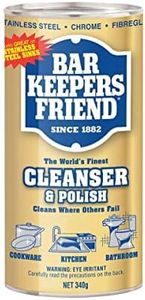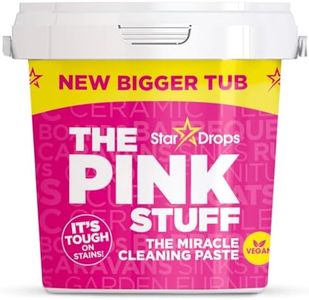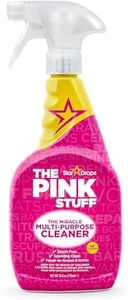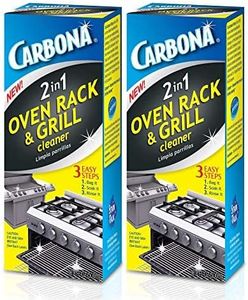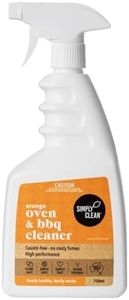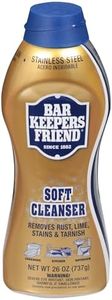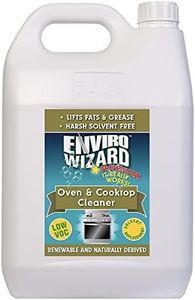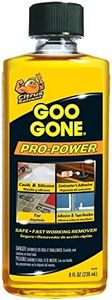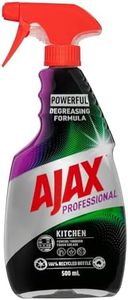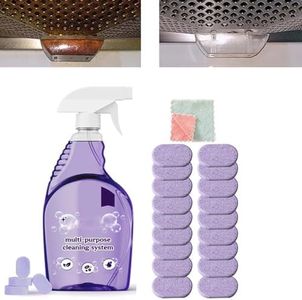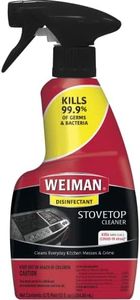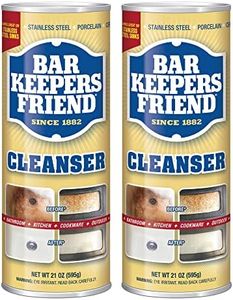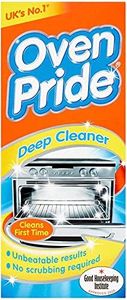We Use CookiesWe use cookies to enhance the security, performance,
functionality and for analytical and promotional activities. By continuing to browse this site you
are agreeing to our privacy policy
10 Best Oven Cleaners
From leading brands and best sellers available on the web.By clicking on a link to a third party's website, log data is shared with that third party.
Buying Guide for the Best Oven Cleaners
Choosing the right oven cleaner can make the job of cleaning your oven much easier and more effective. Since ovens accumulate a mix of baked-on food, grease, and stains, the right cleaner should suit both your cleaning goals and your level of sensitivity to chemicals. Before you buy, think about whether you want to do a quick clean or a deep clean, as well as your preferences regarding fumes, eco-friendliness, and ease of application. Knowing a bit about the different features can help you choose a cleaner that matches your cleaning style and household needs.Type (Spray, Gel, Foam, Aerosol, Wipes)This specification refers to the physical form in which the oven cleaner is delivered. Sprays and foams are popular because they are easy to apply and coat large surfaces evenly, making them great for regular oven maintenance. Gels are thicker and stick to vertical surfaces longer, which is ideal for deep cleaning very dirty ovens. Aerosol cans offer quick application but can be tricky to control, and wipes are best for small touch-ups rather than heavy-duty cleaning. To decide, think about how dirty your oven usually gets and whether you prefer a product for deep cleans or frequent light maintenance.
Strength (Heavy-Duty vs. Mild/Natural)Strength indicates how powerful or harsh the cleaner is. Heavy-duty cleaners often have strong chemicals designed to break down the toughest grease and burnt-on residue, while milder or natural cleaners use gentler ingredients and are better for regular touch-ups or for people with sensitivities. If your oven has a lot of built-up grime, a heavy-duty cleaner may be necessary; if you prefer safer ingredients for children or pets, or just need light cleaning, opt for milder or natural formulas.
Scent and Fume LevelThis specification concerns how strong the smell is and whether the cleaner produces fumes. Some traditional oven cleaners emit strong odors and fumes, which may require good ventilation or even masks. Fume-free and low-odor formulations are much more comfortable to use, especially in smaller kitchens or for people sensitive to strong smells. If you dislike strong chemical scents, look for 'fume-free' or 'low odor' labels, and always consider your kitchen’s ventilation when choosing.
Surface CompatibilityNot every oven cleaner is safe for every material. Some are designed specifically for traditional metal ovens, while others are safe for self-cleaning ovens, glass doors, stainless steel, or grills. Using the wrong type can damage your oven’s surfaces. Always check if the cleaner is compatible with your oven’s materials—if unsure, choose a cleaner labeled as safe for multiple surfaces or follow the recommendations in your oven’s manual.
Application TimeThis tells you how long the cleaner needs to sit on the surface before you can wipe it off. Quick-acting cleaners can be wiped off in just a few minutes, which is handy for routine cleaning; deep cleaners may need to be left on for 30 minutes or more to break down stubborn grime. If you’re short on time or prefer frequent light cleanings, go with a fast-acting product; if tackling heavy buildup, choose one that works over a longer soaking period.
Ease of Use and CleanupThis refers to how simple it is to apply the cleaner and remove the residue afterward. Some formulas rinse away easily with water or a damp cloth, while others may leave behind a film or require more scrubbing. If you want a cleaner that saves you effort, look for those that advertise easy wipe-off or no-scrub features. Consider your willingness to do extra scrubbing and whether you want a product that’s quick and straightforward.
